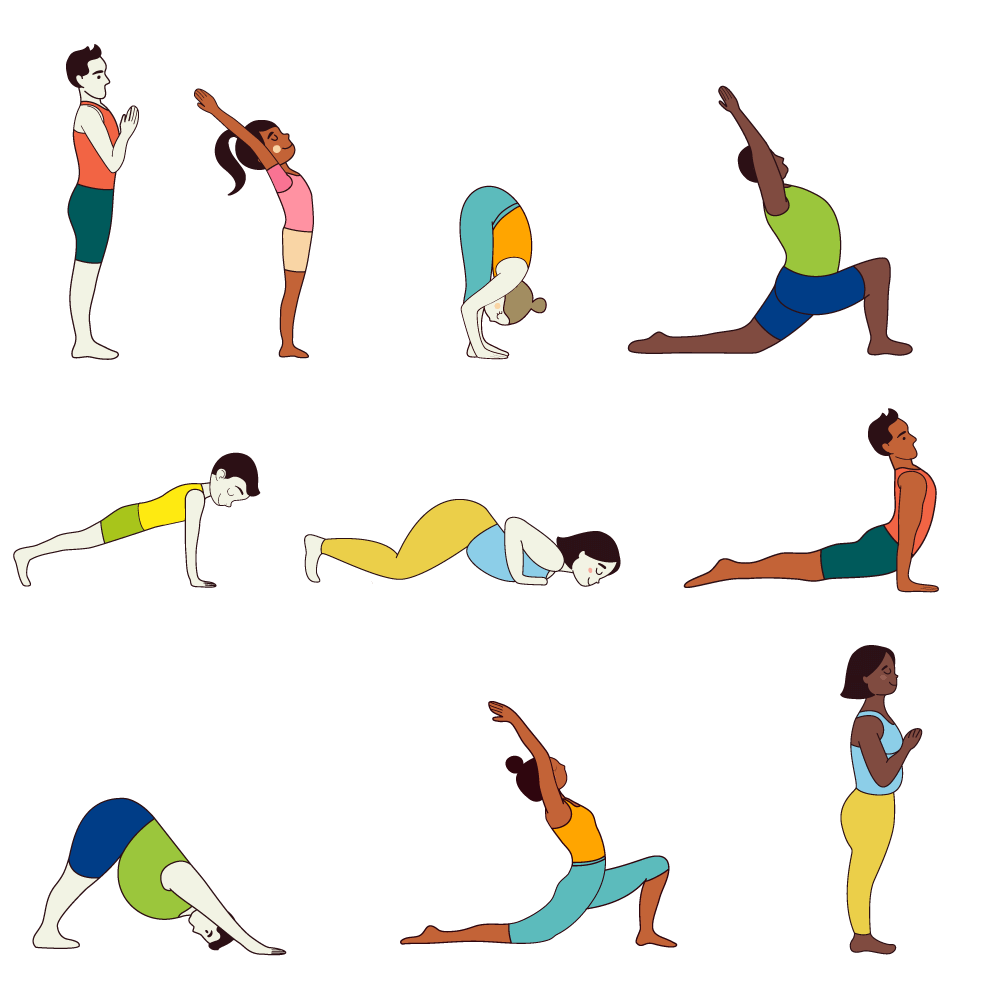Yoga is an ancient practice that offers holistic benefits of yoga for the mind, body, and spirit. It has been cherished for thousands of years and is known for its profound impact on overall well-being. In this guide, we will explore the numerous advantages of yoga, focusing on its physical, mental, emotional, and spiritual benefits.
importance of yoga in our life
- Mental Health:
- Yoga encourages relaxation and stress reduction through controlled breathing and meditation.
- It has been linked to reduced anxiety and improved mood, contributing to better mental well-being.
- Mind-Body Connection:
- The practice of yoga emphasizes the connection between the mind and body.
- It cultivates mindfulness, allowing individuals to stay present and focused in the moment.
- Improved Sleep:
- Regular yoga practice has been associated with better sleep quality.
- Relaxing poses and meditation can help calm the mind, promoting restful sleep.
- Stress Management:
- Yoga serves as a powerful tool for managing daily stressors.
- Mindful movement and breath awareness help in reducing the physiological effects of stress.
- Enhanced Concentration:
- The focus on breath control and concentration in yoga can improve cognitive function.
- Practicing mindfulness on the mat translates to increased concentration in daily life.
- Holistic Fitness:
- Yoga is a holistic approach to fitness, addressing physical, mental, and emotional aspects.
- It complements other forms of exercise, promoting overall well-rounded fitness.
- Community and Support:
- Yoga classes foster a sense of community and support.
- The shared experience creates a positive environment, enhancing the overall impact of the practice.
- Adaptability for All Ages:
- Yoga is accessible to people of all ages and fitness levels.
- It can be adapted to individual needs, making it suitable for everyone.
- Self-Reflection:
- Yoga encourages self-reflection and self-awareness.
- The meditative aspects allow individuals to explore their thoughts and emotions.
- Positive Lifestyle Habits:
- Engaging in yoga often leads to positive lifestyle changes.
- It promotes healthier habits, such as mindful eating and a more balanced approach to life.
- Incorporating yoga into daily life goes beyond physical exercise; it nurtures a holistic approach to well-being, fostering a healthier and more balanced lifestyle.
- It has been linked to reduced anxiety and improved mood, contributing to better mental well-being.
benefits of yoga asanas
- Enhanced Flexibility:
Engaging in yoga asanas regularly promotes flexibility by stretching and lengthening muscles. This increased flexibility not only improves overall mobility but also helps prevent injuries and reduces muscle tension. - Stress Reduction:
Yoga asanas, with their focus on mindful breathing and relaxation, contribute significantly to stress reduction. The controlled breathing patterns and meditative aspects of yoga help calm the nervous system, promoting a sense of tranquility and mental well-being. - Improved Posture and Balance:
Many yoga poses emphasize proper alignment and balance, leading to improved posture. Regular practice of asanas strengthens core muscles, supports spinal health, and enhances overall body awareness, reducing the likelihood of postural issues. - Increased Strength and Endurance:
Yoga is a full-body workout that builds strength by using body weight for resistance. Asanas target various muscle groups, contributing to increased overall strength and endurance. This can positively impact daily activities and other forms of exercise. - Mind-Body Connection:
Yoga fosters a profound connection between the mind and body. As you move through different poses, the emphasis on breath awareness and mindfulness promotes a deeper understanding of your body’s capabilities, fostering a holistic approach to health and well-being.
Physical Benefits of Yoga:
- Improved Flexibility: Yoga involves various poses and stretches that enhance flexibility. Regular practice can lead to increased mobility in joints and muscles.
- Enhanced Strength: Many yoga poses require the use of body weight for resistance, which can improve overall strength.
- Better Posture: Yoga promotes awareness of body alignment and helps individuals maintain proper posture, reducing the risk of musculoskeletal issues.
- Balanced Body Weight: Some forms of yoga, such as power yoga, are excellent for weight management as they involve vigorous movements and calorie burning.
- Pain Relief: Yoga can alleviate chronic pain conditions, such as back pain, arthritis, and headaches, by improving body awareness and reducing muscle tension.
- Improved Balance: Yoga poses that require balance can enhance stability, which is particularly beneficial for older adults.
Mental Clarity and Stress Relief:
- Stress Reduction: Yoga’s emphasis on deep breathing and relaxation techniques helps reduce stress and anxiety.
- Enhanced Concentration: Yoga encourages mindfulness and focus, which can improve concentration and cognitive function.
- Emotional Balance: The practice of mindfulness in yoga helps individuals manage their emotions, leading to emotional stability.
- Better Sleep: Yoga can promote a good night’s sleep by relaxing the nervous system and reducing insomnia.
- Mind-Body Connection: Yoga fosters a strong connection between the mind and body, which can improve mental health and overall well-being.
Emotional Well-being :
- Reduced Depression: Studies have shown that yoga can be an effective complementary treatment for depression.
- Boosted Self-esteem: Yoga promotes self-awareness and self-acceptance, leading to improved self-esteem and confidence.
- Increased Resilience: Practicing yoga helps individuals build emotional resilience, enabling them to better cope with life’s challenges.
- Mindful Eating: Yoga encourages mindful eating habits, which can lead to healthier food choices and better weight management.
Spiritual Growth and Self-Discovery :
- Inner Peace: Yoga fosters inner peace and contentment, allowing individuals to experience a sense of calm.
- Enhanced Intuition: Through meditation and introspection, yoga can help individuals trust their instincts and intuition.
- Connection to a Higher Power: For many, yoga serves as a spiritual practice that connects them to a higher power or greater sense of purpose.
Health Management in benefits of yoga:
- Chronic Disease Management: Yoga can be a complementary therapy for conditions like heart disease, diabetes, and hypertension.
- Pain Management: Individuals dealing with chronic pain conditions can find relief through yoga’s holistic approach.
- Cancer Recovery: Yoga is increasingly used to support cancer patients during treatment and recovery, helping them manage stress and regain physical strength.

Practical Tips for Starting Your Yoga Journey:
- Choose the Right Yoga Style: There are various yoga styles, such as Hatha, Vinyasa, and Ashtanga. Select the one that aligns with your goals and fitness level.
- Find a Qualified Instructor: A certified yoga instructor can provide guidance and ensure that you’re performing poses correctly.
- Set Realistic Goals: Start with achievable goals and gradually progress to more advanced poses and practices.
- Create a Consistent Routine: Consistency is key in yoga. Set a regular schedule that you can maintain.
benefits of yoga for men
- Improved Flexibility:
- Yoga helps men enhance their flexibility by stretching and lengthening muscles.
- Increased flexibility reduces the risk of injuries and enhances overall athletic performance.
- Stress Reduction:
- Regular yoga practice provides effective stress management tools.
- Deep breathing and relaxation techniques promote mental calmness and emotional well-being.
- Enhanced Strength and Muscle Tone:
- Yoga poses require engaging various muscle groups, promoting overall strength.
- Improved muscle tone contributes to a more balanced and resilient physique.
- Better Posture:
- Yoga emphasizes proper alignment and body awareness, aiding in the correction of poor posture.
- Improved posture reduces strain on the spine and supports overall spine health.
- Mind-Body Connection:
- Yoga encourages the connection between the mind and body through mindful movement and breath.
- Developing this awareness can enhance focus, concentration, and mental clarity.
- Increased Energy Levels:
- Yoga incorporates breath control, promoting better oxygenation of the body.
- Improved circulation and energy flow result in increased vitality and reduced feelings of fatigue.
- Prostate Health:
- Certain yoga poses, such as pelvic floor exercises, can support prostate health in men.
- These practices may contribute to better urinary and reproductive function.
- Boosted Immune System:
- The relaxation and stress-reducing benefits of yoga positively impact the immune system.
- A stronger immune system helps defend against illnesses and supports overall health.
- Heart Health:
- Yoga has cardiovascular benefits, promoting heart health through improved circulation.
- Practices like pranayama (breath control) can enhance respiratory function.
-
Weight Management:
- Regular yoga practice, when combined with a healthy lifestyle, can aid in weight management.
- Yoga’s mindful approach to eating and awareness of body sensations can support weight loss goals.
- Social Connection:
- Joining yoga classes or groups provides an opportunity for social interaction.
- Building a sense of community can contribute to positive mental health outcomes.
- Better Sleep:
- Yoga’s relaxation techniques and calming practices can improve sleep quality.
- Reduced stress and a more relaxed mind contribute to a more restful night’s sleep.
benefits of yoga for women
- Stress Relief:
- Yoga provides a calming escape, helping women manage stress and promote mental well-being.
- Breathing exercises in yoga can reduce cortisol levels, the stress hormone, fostering a sense of tranquility.
- Physical Flexibility:
- Regular yoga practice enhances flexibility, aiding in improved posture and preventing muscle stiffness.
- Flexibility gained through yoga can be especially beneficial for women in various stages of life, from pregnancy to menopause.
- Strength Building:
- Yoga involves body-weight exercises that build strength without bulk, promoting a toned and balanced physique.
- Strengthening core muscles through yoga can contribute to better stability and reduced risk of injuries.
- Hormonal Balance:
- Certain yoga poses and practices can help regulate hormonal imbalances in women, particularly during menstruation and menopause.
- The mindful aspect of yoga may positively impact the endocrine system, promoting hormonal harmony.
- Improved Sleep Quality:
- Yoga’s relaxation techniques can ease insomnia and improve sleep quality.
- Women often find relief from sleep-related issues through yoga, contributing to overall health and vitality.
-
Enhanced Emotional Well-being:
- Yoga encourages mindfulness and self-awareness, fostering emotional resilience.
- The practice of yoga may reduce symptoms of anxiety and depression, providing a holistic approach to mental health.
- Prenatal and Postnatal Health:
- Prenatal yoga supports the changing body during pregnancy, offering gentle stretches and breathing exercises.
- Postnatal yoga helps women regain strength and flexibility, addressing the physical and emotional aspects of motherhood.
- Community and Connection:
- Yoga classes provide a supportive community, fostering connections among women.
- Shared experiences in yoga classes create a sense of belonging and encouragement.
- Heart Health:
- Yoga’s gentle movements and stress-reducing benefits contribute to heart health.
- The practice may help lower blood pressure and improve overall cardiovascular well-being.
- Enhanced Body Awareness:
- Yoga emphasizes mindful movement, enhancing body awareness and acceptance.
- This increased awareness often leads to healthier lifestyle choices and a positive self-image.
- Incorporating yoga into a woman’s routine can offer a holistic approach to health, addressing both physical and mental well-being. Whether seeking stress relief, flexibility, or a sense of community, the benefits of yoga for women are diverse and impactful.
benefits of yoga for students
- Stress Reduction:
Engaging in yoga helps students manage stress by promoting relaxation and mindfulness. The practice encourages deep breathing and meditation, offering effective tools to cope with academic pressures and daily challenges. - Improved Concentration:
Yoga enhances concentration and focus, crucial for students during study sessions. Through various poses and breathing exercises, students can sharpen their mental clarity, aiding in better retention of information and improved academic performance. - Enhanced Physical Health:
Yoga is not only about mental well-being; it also contributes to physical health. Regular practice improves flexibility, strength, and posture. This physical well-being positively impacts students, supporting their overall health and vitality. - Better Sleep Patterns:
Many students struggle with sleep issues due to stress and irregular routines. Yoga promotes relaxation and helps regulate sleep patterns. Establishing a calming pre-sleep routine with yoga can contribute to better and more restful sleep. - Emotional Balance:
Yoga fosters emotional balance by encouraging self-awareness and a connection between the mind and body. This emotional stability is beneficial for students dealing with the ups and downs of academic life, helping them navigate challenges with resilience and a positive outlook.
Also Read : Lemon Water: Uses, health Benefits and Side Effects
Yoga offers a comprehensive approach to well-being that encompasses the physical, mental, emotional, and spiritual aspects of our lives. Its myriad benefits are accessible to individuals of all ages and fitness levels. Whether you’re seeking physical strength, mental clarity, emotional balance, or spiritual growth, yoga can be a transformative journey toward a healthier, more harmonious life. Embrace the practice of yoga and unlock the holistic well-being it has to offer.
Some frequently asked questions

- benefits of yoga essay or essay on benefits of yoga
- “I believe that above blog can assist you in writing an essay on the benefits of yoga.”
- benefits of yoga speech or speech on benefits of yoga
- “I believe that above blog can assist you in writing speech on the benefits of yoga.”
- benefits of yoga in english
- “I believe that the above blog has already covered the benefits of yoga in English.”
-
What are 5 main benefits of yoga
- Yoga is more than just stretching and bending – it’s a holistic practice with many benefits for our body and mind.
- it boosts flexibility, making your body more agile.
- it enhances strength, not just physically but also in finding balance within yourself.
- Tyoga is a stress-buster, calming your mind and promoting relaxation.it improves posture, helping you stand tall and feel confident.
- regular yoga practice can enhance your overall well-being, fostering a healthier and happier lifestyle.
- Should I do yoga everyday
- Engaging in yoga every day can be a positive choice for many. Yoga offers not just physical benefits, like flexibility and strength, but also helps to calm the mind and reduce stress. Doing yoga daily provides a routine that promotes well-being, both mentally and physically. However, it’s important to listen to your body and not push too hard. If you enjoy it and feel good afterward, making yoga a daily habit can contribute to a healthier and more balanced lifestyle.
- Is 1 hour of yoga too much
- No, practicing yoga for one hour is not too much for many people. In fact, an hour of yoga can offer numerous benefits for both the body and the mind. It allows for a well-rounded practice, including warm-up, various poses, and relaxation. However, it’s essential to listen to your body and choose a duration that feels comfortable for you. Beginners might start with shorter sessions and gradually increase the time as they become more accustomed to the practice. The key is to find a balance that suits your individual needs and enhances your overall well-being.







